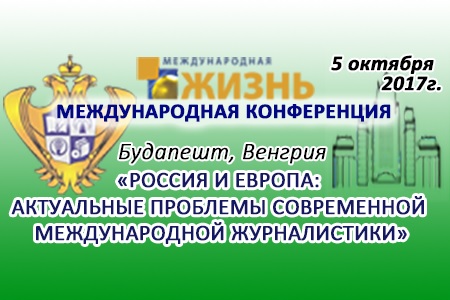On 5th of October in Budapest (Hungary) will be held an international conference «Russia and Europe: Topical Issues of Contemporary International Journalism». The conference is organized by the International Affairs magazine with support of the Ministry of Foreign Affairs and Federal Agency for Press and Mass Media of the Russian Federation.
The main topics to be discussed during the conference are: «Russia-Europe relations: is “reset” possible? Role of media», «Revival of neo-Nazism: analysis of media technologies used by interested parties. Creating a Counterstrategy» and «Media of Russia and Europe. View from the inside». The main goal of this annual international conference is to cover the issues of interaction between Russian and European media.
Official opening ceremony will be held by: Vladimir Sergeev, Ambassador Extraordinary and Plenipotentiary of the Russian Federation to Hungary; Tatiana Naumova, Deputy head of the Federal Agency for Press and Mass Communications of the Russian Federation; Armen Oganesyan, Editor-in-chief of «International affairs» magazine; Ján Čarnogurský, Prime Minister of Slovakia (1991 – 1992), Chairman of the Slovak-Russian association.
Armen Oganesyan, Editor-in-chief of «International affairs» magazine, chairman of the conference:
"In the era of information and communication technologies rapid growth, the media have an important role in the common efforts of improving situation in Europe and worldwide. Significant response that we received from future conference participants shows their willingness to dialogue. Today, if we want to have peace on European continent, there exist no alternatives other than dialogue on different levels."
Experts of Russian and European Medias, and also representatives of other similar fields will share their opinions: Alexander Bikantov, Deputy Director of the Information and Press Department of the Ministry of Foreign Affairs of the Russian Federation (Russia); John M. Nomikos, Director at the Research Institute for European and American Studies (Greece); Izabella Pashinyan, Head of the General Director Department of ANO “Public Television of Russia” (Russia); Andrey Rikhter, Senior Adviser at the Office of the OSCE Representative on Freedom of the Media (Austria); Gábor Stier, observer of the “Magyar Nemzet” (Hungary); Viacheslav Charskiy, Deputy Chief Editor at the Russia Beyond The Headlines (Russia); Tiberio Graziani, President of the Institute of Advanced Studies in Geopolitics and Auxiliary Sciences, director of Geopolitika magazine (Italy); Chavdar Minchev, Editor-in-chief at the International Relations magazine (Bulgaria); Ján Ďuriník, Editor at the “Extra Plus” monthly magazine (Slovakia); Cheng Yu-Chin, Director of the EU-China Economics & Politics institute (Czech Republic); Valery Platonov, Director, Russian Centre for Science and Culture in Budapest (Russia); Anis H. Bajrektarevic, Professor, Intl. law & global pol. studies, Vienna Austria & Editor of the intl. journal (GHIR) «Geopolitics, History, International Relations», Addleton Academic Publishers - New YorK (Austria) and many others.
Informational partner of the conference:
Magyar Demokrata
Additional information:
International conference «Russia and Europe: Topical Issues of Contemporary International Journalism» is held annually in different countries. List of participants traditionally included directors of European media, politicians, diplomats, political and media scientists, management of international media companies.
First conference took place on November 2011 in Paris and has proved the importance of collaboration between Russian and European media not only for journalists, but also for their audience. It had a significant resonance in the Russian and European media, which defined it as "the most important event in the international media space". Main sessions of the conference were: National interests and international journalism, Problems of access to information for the media in Russia and Europe, The role of media in relations between two countries and their impact on international climate and International journalism: international ethical standards and common ethical rules.
Second conference was held on October 2012 in Berlin. It was devoted to the issues of national interest representation in international journalism, development of an international climate through media, new technological opportunity for international media, working conditions in Europe for Russian speaking media. In particular, the conference had the following sessions: The role of the international media in shaping image of the country: the responsibility and ethics of journalists; International journalism and analytics at the modern intensity of information flow: the quality or speed?; Coverage problems of international conflicts in the Russian and European media: a view from inside or outside?; The form of legitimacy regulation of the media: case law or legal?
Third conference took place on October 2014 in Vienna and was dedicated to coverage in European and Russian Media of the most important and actual calls of the 21st century, such as: humanitarian challenges; economic crises; global threats. It had the following sessions: Information personality security in the conditions of information war. International assistance: support or influence; New Dimensions of World Energy. Global humanitarian challenges in the media mirror: objective information and geopolitics. The little-known aspects of illegal migration. The media in the face of extreme conditions.
Fourth conference took place on October 2015 in the Republic of San Marino and revealed the importance of today's dialogue between Europe and Russia, and its further development. It had the following sessions: Europe – Russia: How to Find New Objectivity Within New Reality?; Macro and Micro. Relations between Russia and small states.
Fifth conference was held on 29th of September, 2016 in Bratislava, the Slovak Republic. It covered two main topics: Self-consciousness of media against biased news and Image of Russia and Russians in European media. It has the following sessions: Self-consciousness of media against biased news and Image of Russia and Russians in European media.
read more in our Telegram-channel https://t.me/The_International_Affairs

 14:59 04.10.2017 •
14:59 04.10.2017 •























